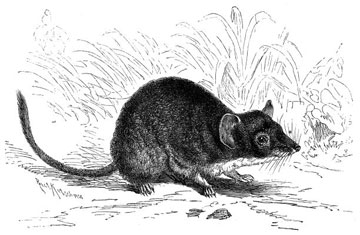Lots of sex produces healthier offspring — for carnivorous marsupials
Lots of sex produces healthier offspring — for carnivorous marsupials
mongabay.com
November 1, 2006
Promiscuous females are more likely to give birth to healthier offspring — at least in mouse-sized, insect-eating marsupials — say researchers at The Australian National University (ANU).
ANU scientists showed, for the first time, that promiscuity increases the survival rate of offspring in an animal species, the brown antechinus (Antechinus stuartii) nocturnal, forest-dwelling, carnivorous marsupial. Their results are published in the current edition of the journal Nature.
“Scientists have developed many theories to explain why some female animals have multiple sex partners: whether it’s trading sex for food and protection, dealing with infertile males, or avoiding the negative effects of inbreeding in species that can’t recognise their relatives,” said Dr Diana Fisher, an ANU professor at the School of Botany and Zoology who lead the research team.

|
“Another theory is that mating with multiple males would result in sperm competition. This means that males with the strongest sperm are more likely to become sires and father better quality offspring. Until now, this theory hasn’t been demonstrated convincingly,” he added.
The team — which in addition to Dr Fisher, included Andrew Cockburn, Mike Double, Michael Jennions, and Simon Blomberg — captured wild antechinuses and brought them into captivity for the mating seasons in two successive years. The researchers then used various combinations of males and females. A media release from ANU explains:
“Some females were only allowed one mate, while others had three. Groups of three males were mated (one at a time) with three different promiscuous females, so that paternity tests could reveal their success at sperm competition.”
“In one year, we released families back into the wild when the babies were still in the mother’s pouch,” said Dr Fisher. “The result was that survival of babies with promiscuous mothers was almost three times as high as those in the monogamous group.”
“The next year, we kept families in captivity until the babies were almost weaned. Again, babies of promiscuous mothers did much better. Paternity tests showed that the sperm of some males were far more successful than others, and, most important of all, that babies fathered by these males were twice as likely to survive.”
This article is based on a news release from The Australian National University.







